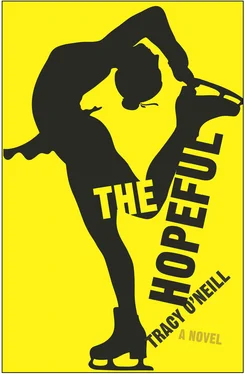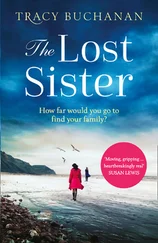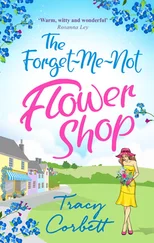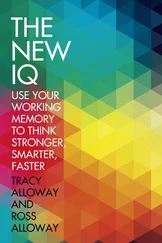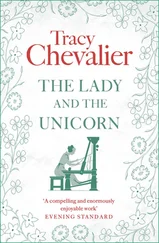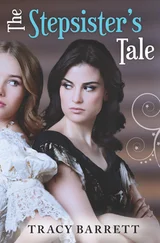So to ensure I wasn’t an alcoholic loner, she decided to send me to AA with my cousin Mo. Mo would raise me up to two friends including Lucy. Three if a tutor counted as a friend. Then too there was the idea that tagging along would deter me. See the worst, and maybe I wouldn’t even begin mounting to the pinnacle of the slippery slope. See the worst, and I might never get to the extremity of Vincent Foster, binge drinker. I told my mother she didn’t have to worry about overindulgence, but she reasoned figure skating.
“Addiction comes in many forms,” she said. “And the first step is admitting you have a problem.”
“Don’t shrink me again,” I said. Because wasn’t it my mother whose idea it had been for me to see Dr. Ogden? This mawkish cliché of self improvement from the woman who had thought the solution to falling for hours was the voice of the audio book playing in our car parked outside the Skating Club of Boston?
“Only the open heart will let love in,” she said now. She’d picked the phrase up from Ogden’s audiobook You Are Your Own Self Help Book , which I’d always referred to as What’s The Point Then?
Recently the trees in our yard had turned brilliant briefly, then curled dry, leaving brown patchwork to the street beyond. To walk outside was to hear destruction, the tread of crushing dead leaves, and my mother was always not done raking. The fall kept falling no matter her efforts. Now she pulled on her gardening gloves.
“Wouldn’t you rather I fight the losing battle with you than go to AA?” I asked.
“Quality not quantity,” she said, flapping leaves into piles that blew back over the yard. “It’s an ongoing project.”
“Like friendship,” I said.
“Nothing like that at all,” she said. “No friendship should take more than two weeks. You meet, you decide if you’re going to be friends, you’re done. That’s how Aunt Dina and I became friends.”
“Aunt Dina and you became friends by being born from the same person.” A dead October leaf went to dust in the crush of my palm.
“Well it certainly didn’t take more than two weeks,” my mother said. I’d been back to school long enough to have made friends, she figured. Every day when I returned from school, she asked why I didn’t bring anyone home. I told her I brought myself, but she said you couldn’t bring yourself. You went and inevitably your self followed.
“You just need to make a niche for yourself.”
“Make it out of what?”
“Ali, if you’re always laughing at people, you’ll never laugh with them.” She stopped raking and rested her head on her elbow on the handle.
“Why should I want to with?”
“Because it’s better to be with than without.”
Planning a response, I pulled a plastic tarp to the bottom of our driveway, rippling it hard to loosen leaves. Up the hill to our house, my mother beat a bush to extricate the fallen mess, and branches cracked beneath the beating of the rake.
“Do you remember what I told Dad when he asked if I’d consider auditioning to skate pairs with Claude Marcus when he came to Boston?” I asked. “I said I didn’t want to be half of anything, even if it was victory, and I said I didn’t need a Randy Gardner on my hands either.”
“Who?”
“Randy Gardner, you know: pairs skater, took a painkiller shot right before the Olympics, got so numb he couldn’t skate. His partner Tai Babilonia trained years for that night, and he took away her entire life because he couldn’t stand the pain.”
“Ali, if you had friends that took painkillers it wouldn’t cost you the Olympics anymore,” she said. “Okinawans understand the key to longevity, and they socialize all the time. It’s healthy.”
“Their diet is impeccable,” I said. “And anyway, I’m Native American.” I enunciated my background meaningfully. Would she admit how afraid of my genetics she was? Or would she pretend she wanted me to be everyone else, regular, like her— when she knew I couldn’t be?
She pulled broken branches from the rake and threw them onto my empty tarp, cracking and smashing unnecessarily. “You’re American. Why must you always insist on being different?”
Because I was, I thought, looking at the pink of her neck freckling beneath the autumn sun. Wasn’t that what she’d meant when she’d told me, You could be anyone?
“Anyway who said I want longevity?” I said finally.
“That’s not funny,” she said.
“Quality, not quantity, mom.” I puckered a merry little kiss on her cheek.
“Do you want to be code yellow?”
“I don’t want to be part of any color coding at all!”
“Well you are, and you should be thankful there is a color code for all of our safeties.” She bent down and broke a branch. “Anyway, I’ll give you sixty dollars.”
I laughed. This was something I loved about my mother, her innocent willingness to think there were easy solutions. A pill here, sixty dollars there. Clichés as needed. “I don’t want money.”
“And I don’t want you to be filed code yellow. Consider us even.”
At AA, most of the conversation was identification: You know you’ve got a problem when you’ve never left a last sip. You know you’ve got a problem when the hair of the dog gets so big it’s another dog. These people were Darwinian wonders. Around the circle, the stories and voices were different, but the revelations were the same: I’ve got a problem; who knew you could do this to yourself and stay alive? Some people held a pastry in one hand and coffee in the other. I watched Mo eat three pastries, the sheen of spit and sugar glinting stickily around his mouth.
“You know you’ve got a problem,” one woman began, “when you say, ‘Beer’s not alcohol. It’s a carbonated beverage!’” A few people laughed and nodded. “I met this girl once outside a bar I’d been kicked out of. She told me I should grab a matchbook from every bar I was asked to leave, you know, get my money’s worth. I told her, ‘Honey, my apartment’s not big enough for that.’” I couldn’t tell if her pride was that of successful joking or of the audacity of radical drinking. Another woman said it wasn’t that she chose quantity over quality; it was that she’d always thought quantity was quality. “Two fingers? More like two feet!” she said, miming a glass of scotch the size of her torso.
“I’m down two teeth,” a man told the circle. “Thirty-two is how many permanent teeth a human being is supposed to have, and I’ve had thirty since I lost two to a shot glass. After the implants, my sister said to me an Irish Car Bomb tastes like a milkshake, so why didn’t I just drink a milkshake? How do you explain to someone like that, my taste isn’t for the taste?” He balled up a napkin. “I keep wondering when I’m going to feel like an after photo in a diet commercial, you know, smiling, proud, just holding up my old pants and seeing evidence that I’m better off. Thinking about not thinking about it is still just thinking about it, though. So I ask myself all the time, am I really getting any better, or am I just taking the scenic route?”
Sometime while the guy with fake teeth was speaking, Mo had left the meeting to go to the bathroom, and I hadn’t noticed until everyone was leaving. There were still a few cookies and a huddle around them as I walked past. The people that didn’t linger by the pastries could be found outside lighting cigarettes. I waited beside Mo’s truck watching little orange circles glow between fingers postured in sails of smoke.
“John Doe.”
“I’m sorry?” I looked toward the voice, and there was someone from the meeting, hand reaching forward. It was the scenic route guy. He looked different in the night, and there was a sharpness to his stubble that glinted beneath the moon.
Читать дальше
